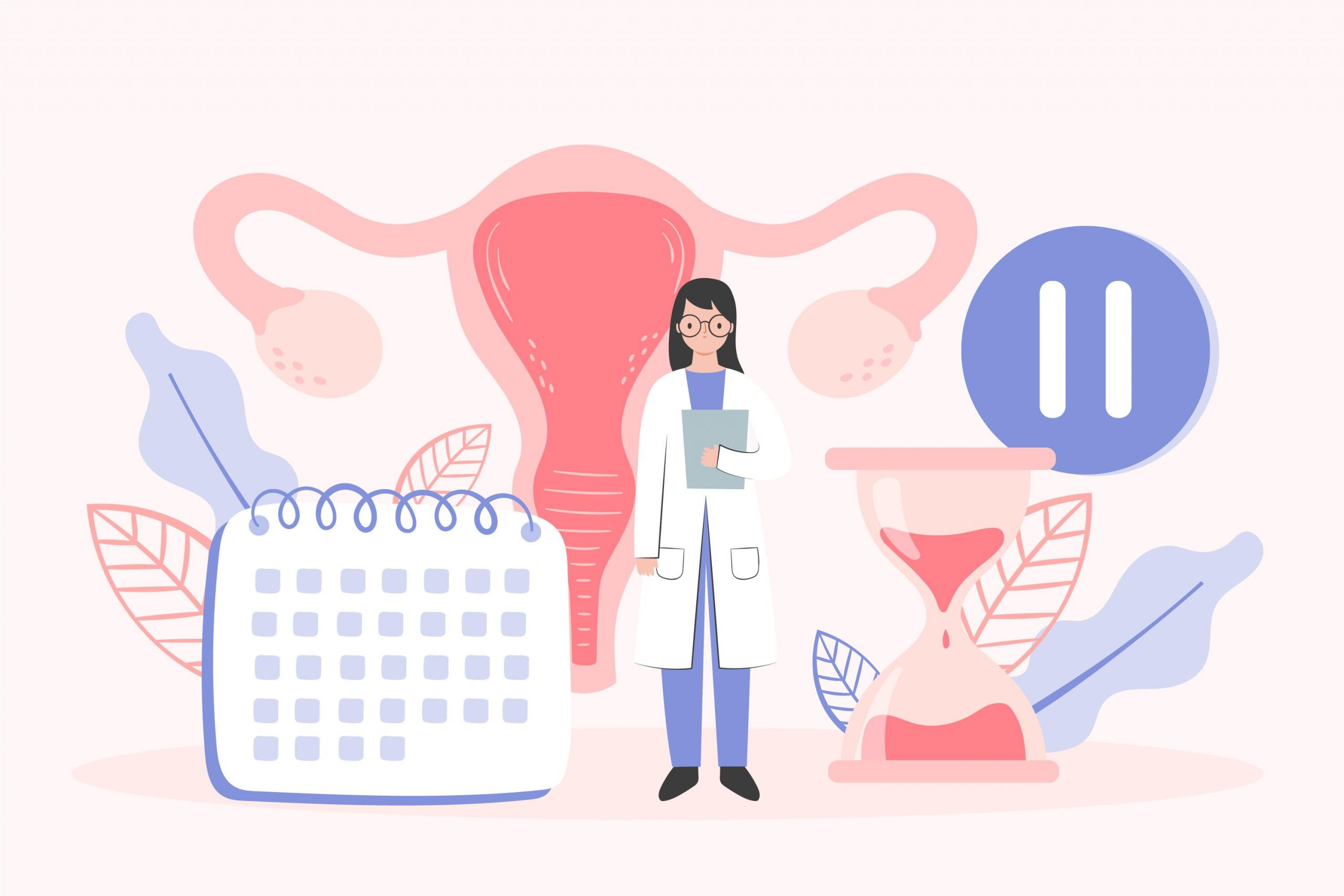
Menopause is a common condition that only appears in women. It helps to mark the time when your menstrual cycles end. In addition, it helps to start a new phase of life at the end of the menstrual cycle. Although it is not a disease, some women might feel discomfort because of hormonal and other changes.
Menopause usually starts between the age range of 40-58 years. The average age of menopause in developed countries is 51 years. However, it can occur earlier based on different conditions like medical history and others. So, let’s dive in to know more about menopause and other information related to it.
What Is Menopause?
Menopause is an entirely normal condition that appears in women after their menstrual cycle ends. If you have gone more than 12 months without having any menstrual period, then it is diagnosed. Although it is a natural process, you might experience some symptoms and discomfort.
In this period, women can not become naturally pregnant anymore. Some factors can make menopause appear early and painful symptoms. The average menstrual age is 51, but it can change based on different factors. The symptoms start to appear four years after the last period. You need to know about these symptoms, causes, effects, and treatment to understand them completely.
Menopause Symptoms
Most women face the symptoms much earlier than the last period, and it stays more than four years after the last menstrual cycle. However, some women might get the symptoms for a long time, nearly 12 years after their last period. It appears to be 1 out of 10 women and is very rare.
Menopause symptoms are unique to women. If menopause occurs in a short time or suddenly, then the symptoms become more severe. Some lifestyle choices can increase the severity of the symptoms, including smoking, alcohol, and others. The postmenopause, perimenopause, and menopause symptoms are pretty similar.
Here are some of the most common and early signs of menopause given below.
- Vasomotor symptoms (night sweats, hot flashes, and flushing)
- Infrequent menstruation
- Lighter periods compared to normal
More than 75 percent of women experience hot flashes.
Some other symptoms that you need to look for include:
- Viginal dryness
- Insomnia
- Weight gain
- Anxiety
- Depression
- Memory problems
- Concentration difficulty
- Dry mouth, skin, and eyes
- Tender or sore breasts
- Reduced sex drive or libido
- Increased urination
- Racing heart
- Headaches
- Reduced muscle mass
- UTIs (Urinary Tract Infections)
- Reduced full breasts
- Stiff or painful joints
- Less bone mass
- Increase the growth of hair in different areas of the body such as the neck, face, upper back, and chest
- Hair loss or thinning
- Emotional changes
As mentioned earlier, these symptoms can vary for every individual woman. In addition, based on some different factors like medical history, lifestyle choices, the symptoms of menopause can differ. However, if you experience any of these symptoms, make sure to see a doctor avoid any kind of pain.
Ignoring them can cause you to go through pain and discomfort. Some symptoms can even become severe if not treated. So, make sure to look for these symptoms if you are feeling any discomfort.
Menopause Causes
Menopause occurs naturally in most women. However, some things can cause menopause to appear. Here are some of the most common ones explained below in detail.
Ovary Removal Surgery
One of the conditions that can make menopause appear sooner is ovary removal surgery. Ovaries are one of the essential parts of our body that produces hormones such as progesterone and estrogen. It helps to regulate the periods or menstrual cycle. If anyone goes through surgery to remove the ovaries, then they will get menopause almost immediately.
You will experience menopause symptoms, and the periods will also stop after the surgery. As the symptoms and signs appear suddenly instead of developing over the years, they can be severe. So, you need to be aware of the changes when having ovary removal surgery.
In uterus removal surgery, you will not get immediate menopause, but the periods will stop. Your ovaries will still be functional and release the hormones along with eggs.
Reproductive Hormones Getting Declined Naturally
Another very common cause of menopause is the reproductive hormones getting declined. When women reach their 30s, the amount of produced progesterone and estrogen starts to decrease. These hormones are essential to regulate menstruation.
At the age of 40, the menstrual periods will get shorter or longer, lighter or heavier, less or more frequent. However, eventually, the ovaries will stop producing and releasing eggs at the age of 51. So, you will have no more periods from that point on.
Radiation Or Chemotherapy
These are some of the cancer therapies that can induce menopause, causing different symptoms like hot flashes and others. The menstrual pause caused by chemotherapy is not permanent always. So, you might need to take the help of birth control measures. On the other hand, radiation therapy is only effective when the radiation is pointed to the ovaries.
Otherwise, radiation therapy on parts like the head, neck, breasts, and others will not affect menopause. So, you need to talk to the doctors regarding it and get confirmed about the surgery process.
Primary Ovarian Insufficiency
Although this is a rare condition and only 1% of women experience it. But it can cause women to get menopause before the age of 40. When the production of ovaries is lower than average, then it can cause premature menopause. Factors like autoimmune diseases or genetic factors can cause lower production.
But there are no proven causes of premature menopause. So, to protect the heart, bones, and brain, healthy professionals might recommend hormone therapy.
These are some of the common causes of menopause. If you develop any of them, make sure to take medical help immodestly.
Menopause Effects
You might have to face many effects after developing menopause. In addition, some of the other medical conditions can be affected by menopause. Here are some of the examples given below.
Osteoporosis
This condition can make the bones weak and brittle, leading to the risk of getting fractures. In addition, after some of the years of menopause, you will begin to lose bone density rapidly. It can increase the risk of developing osteoporosis. Postmenopausal women with osteoporosis are a higher chance of getting fractures at the hips, wrists, and spine.
Blood Vessel And Heart Disease
When the estrogen levels start to decline due to menopause, you have a higher risk of cardiovascular disease. Heart diseases are very threatening, and they can lead to death as well. So, it is essential to have a healthy diet, exercise regularly, maintain average weight, and others. Take the help of your doctor to get some advice on protecting your heart, like controlling blood pressure and reducing cholesterol if it is high.
Sexual Function
Menopause can affect sexual function and cause discomfort as well. Factors such as decreased production of moisture, reduced elasticity, and others can cause vaginal dryness, slight bleeding during intercourse. Decreased sensation might cause reduced sexual desire as well.
In this condition, lubricants and water-based moisturizers can help a lot. However, if vaginal lubricants are not enough, you can take the help treatment of vaginal estrogen, which is available as cream, ring, and tablet.
Weight Gain
Weight gain is one of the common effects among women in their menopausal transition period. You will need to exercise more and eat less to control your weight. Gaining weight can also make many changes in the nature of the menopause symptoms.
Menopause Treatment
As menopause is a natural process, it requires no medical treatments. However, there are some signs and symptoms of menopause that might need the help of specific therapies. Here are some of the most common treatments given below that can help to slow down the signs and get rid of them.
Hormone Therapy
This is one of the most effective treatments that help to get rid of hot flashes. Unfortunately, it is one of the most common symptoms of menopause that can become severe. Based on your and your family’s medical history, the doctor might recommend this treatment. Even the shortest and lowest dose can help you to get relief from the symptom.
You will need to have progestin along with estrogen if you have an intact uterus. Estrogen is beneficial to prevent any type of bone loss. However, long-term hormone therapy can increase breast cancer and cardiovascular risks.
Antidepressants
Low doses of antidepressants can help you to get relief from many menopause symptoms. These antidepressants are related to a drug class called SSRIs (Selective Serotonin Reuptake Inhibitors). These drugs are mainly beneficial to decrease menopausal hot flashes. A low dose of an antidepressant might be much more helpful for women who can’t go through estrogen treatment for different health reasons.
Vaginal Estrogen
Menopause causes vaginal dryness that decreases sexual satisfaction. However, vaginal estrogen can help relieve that dryness with the help of tablets, creams, rings, and others. With the help of this treatment, minor estrogen releases and gets absorbed by the vaginal tissues. As a result, you can get relief from discomfort during intercourse, vaginal dryness, and other urinary symptoms due to menopause.
Conclusion
Menopause is a natural process that occurs in women between 40 to 55 years. However, it can develop earlier as well with different conditions. You need to know all about them, including treatments, symptoms, causes, and effects. Go through every section to find out how it works and changes appear. Menopause is not a serious condition, but ignoring the symptoms can cause them to get severe.
Also Read:
- Cold Symptoms, Causes, Effects, And Treatment
- Hyperglycemia – Symptoms. Causes, Effects, and Treatments
- How Often Should You Wash Your Hair? A Beginners Guide











